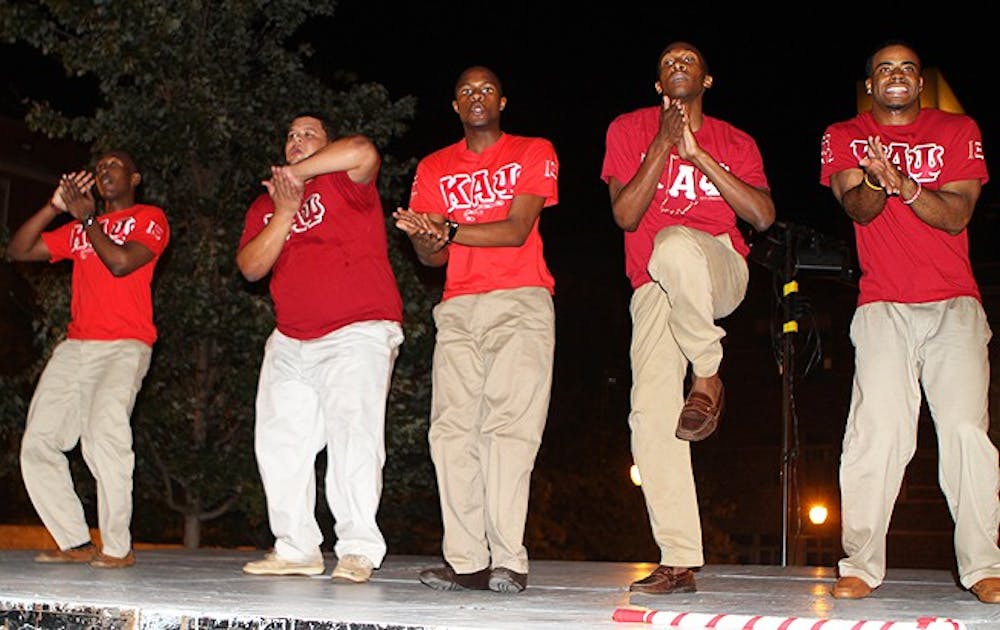The students shouting on the Baldwin Auditorium steps Friday may have surprised some onlookers, but for others the probate signified the culmination of the largely secret entry process into a cultural fraternity.
Duke’s eight historically black fraternities and sororities in the National Pan-Hellenic Council hold probate ceremonies to present new members to the public and showcase performances by those new members of the organization. Whereas Interfraternity Council and Panhellenic Association members join through a formal recruitment process, prospective NPHC members seek out the organization they wish to join. Many students, however, have misconceptions about probates and these organizations in general.
“One of the issues that we deal with is that more often than not, people will have no idea what’s going on when they see a whole lot of black people standing around yelling and screaming because there is a normalization of what greek life is on campus,” said senior Ehizele Osehobo, first vice president of NPHC and president of Phi Beta Sigma fraternity. “IFC and Panhel are the largest councils on campus and so it’s natural that people would expect that to be what Greek life is about.”
IFC and Panhel are the largest greek councils on campus, so they come to define many students’ expectations of what greek life means, Osehobo said. The NPHC and Inter-Greek Council—the other cultural greek council at Duke—are not as well known on campus and struggle with balancing how to target a specific group while still appealing to the broader Duke community, he added.
“I’ve talked to people about why they don’t come to black parties and they say, ‘I don’t want to be the only white guy there,’ or a girl says that if she’s dancing on a black boy, she doesn’t want some black girl coming up to her telling her to get off of her man,” Osehobo added. “Basically people don’t want to be the minority and aren’t used to it. I go to class, and I’m one of the few black people there. I want to be normalized the same way that IFC and Panhel are so I can put up a flyer and everyone considers coming.”
Junior Ciera Price, president of Sigma Gamma Rho sorority, noted that her organization wants to branch out beyond the black community.
“You don’t have to be afraid to come to the events that are hosted by a cultural organization if you’re not that ethnicity,” she added. “I would hope most people at Duke are able to go and have interactions with different groups.”
Price said that students can begin exposing themselves to diversity even if they have not in the past.
NPHC organizations are grounded in their history, defined by combating discrimination, producing members who help improve black communities and a philosophy of an “inclusive we,” Ohesobo said. Therefore, they focus more on service compared to IFC and Panhel organizations that focus more on social life, he added.
“We don’t want people who just want letters across their chest,” Osehobo said. “The benefit of our organizations is that people want to join us. It’s not shotgun—spread it out to everyone and see who bites.”
The NPHC does not have a formal rush process. Instead, interested students must be proactive and do research on their own by going to different academic and social events held by the organizations.
“The reason people are screaming and being so hyped is because people have gone through such a long process and have a lot of pride,” Osehobo said. “Because of the amount of preparation that goes in, it really means a lot by the point of the probate.”
It is important for members to be very informed because joining an NPHC organization is a lifelong commitment and so it’s very important to pick the right one, said junior Floyd Wilks, Alpha Phi Alpha fraternity president.
Alpha Phi Alpha Fraternity held a probate on the steps of Baldwin Auditorium Friday, which approximately 200 students attended, Wilks said.
“Our probate went really well, and the boys that joined did a really good job of being really intense,” Wilks said. “The thing that kind of sucks is sometimes it’s not understandable [to onlookers].”
Though the Facebook event for Alpha Phi Alpha Fraternity’s probate Friday was not visible to the public, Wilks said it was open to everyone, but the person who made the Facebook event forgot to make it public.
Probate times and locations are often painted on the bridge and publicized using tools such as Facebook.
“Probates are not meant to be secret,” Osehobo said. “People just don’t take notice.... We don’t want it to seem that NPHC is going out of their way to hide things,” Osehobo said.
Some, however, see secrecy as an important aspect of the internal affairs of these greek organizations.
For Wilks, the tendency for secrecy arises from the personal nature of the process of joining an NPHC fraternity.
“Part of the NPHC is that we value secrecy and having that type of secrecy sets us apart from any other African American organization,” Wilks said. “Groups in general value secrecy a lot when it comes to certain information that only members should know.”
This approach also has its detractors.
Sophomore Greg McLean, for instance, describes himself as involved with the black community at Duke, but he does not consider himself to be informed about NPHC organizations.
“It’s good that they know the people joining are seriously interested in joining... and that they’ll become involved members,” McLean said. “But it’s a bad thing in that I don’t think they’re necessarily transparent enough, and I think that puts a lot of people off. Maybe if they told more about themselves more people would be interested.”
Get The Chronicle straight to your inbox
Signup for our weekly newsletter. Cancel at any time.

